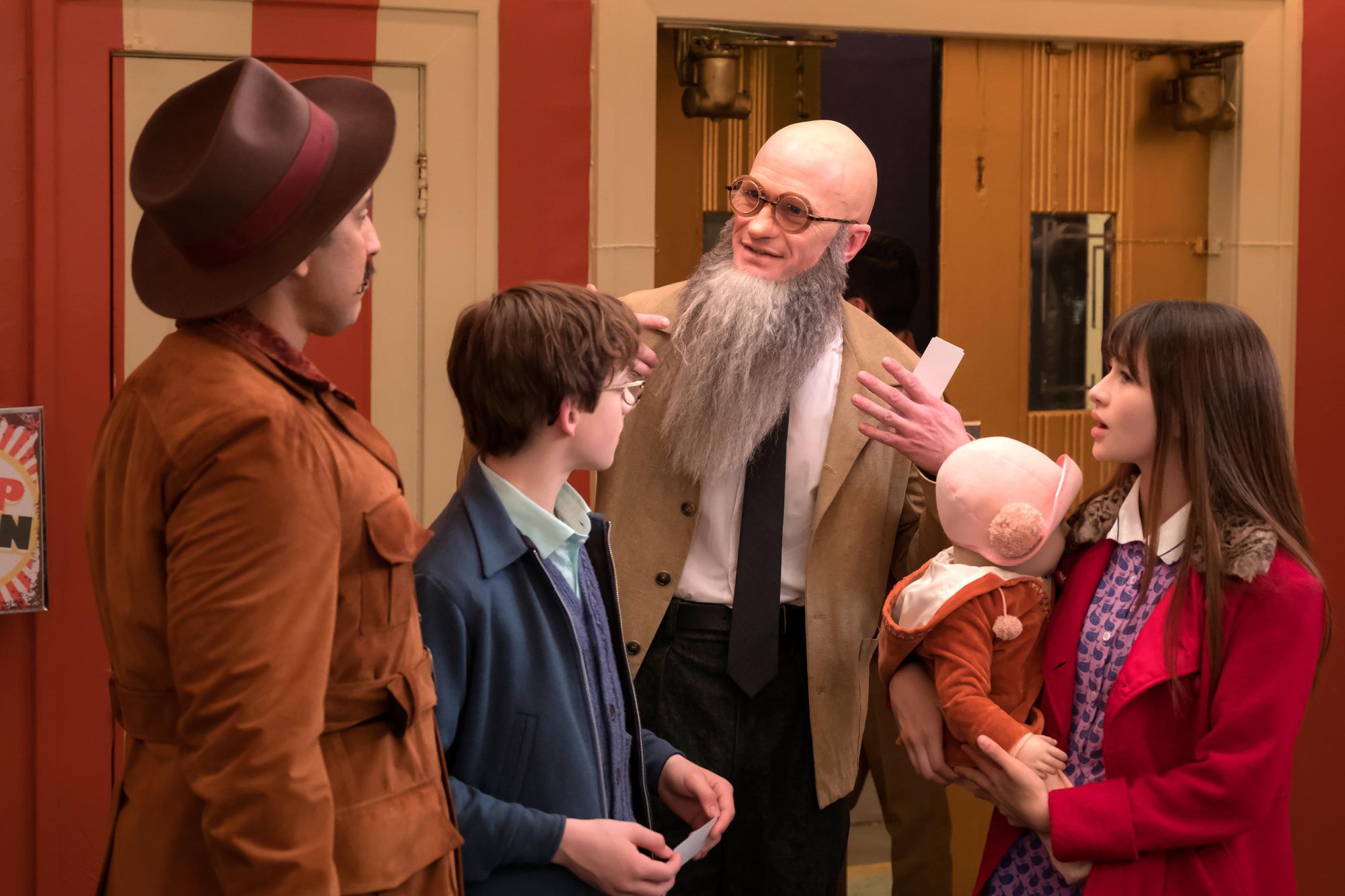“That cry you’re hearing is that of the broken-hearted crocodile.”
In my last review, I mentioned being worried about A Series of Unfortunate Events trying to compress too many books too quickly. I’m here to say I needn’t have worried. “The Reptile Room: Part One” is a promising start to the show’s next arc, and also manages to be its most effective emotionally. If the show is handled with this level of skill each episode, I’m not going to stress about the volume of work it’s trying to adapt.
When last we left the Baudelaires, they were being shipped off to their distant relative Dr. Montgomery (whose first name is, predictably, Montgomery, in the episode’s one real groaner of a joke). Montgomery lives on Lousy Lane, which Lemony Snicket helpfully tells us is “the most unpleasant lane in the world,” but Montgomery himself turns out to be charming. Played by the always-welcome Aasif Mandvi in a nice bit of racially blind casting (Montgomery was played by Billy Connolly in the film version of Unfortunate Events), Montgomery – or Monty, as he prefers to be called – is charming, erudite, and clever. He earns Violet and Sunny’s affections rather quickly (“Perhaps Sunny would prefer…a raw carrot!”) but Klaus is understandably wary. In a nice bit of characterization, Klaus addresses his new guardian as Dr. Montgomery until trust has been earned, at which point he becomes Monty.
This would all be lovely, and in many ways it is, were it not for Snicket popping up and informing us in no uncertain terms that Monty is going to die. Here’s the downside to having the author of the work (well, “author”) appear as a character: when Snicket says Monty is going to die, there’s nothing we or the Baudelaires (or, arguably, Snicket himself) can do to stop it. He treats Violet, Klaus, and Sunny with such respect and kindness that they finally allow themselves to be happy and you find yourself truly rooting for them. For a while, A Series of Unfortunate Events stops feeling like a strange show based on young adult literature.
Of course Olaf is involved in Monty’s death, because it would be a pretty inconsequential episode if he didn’t appear. Sporting a bald cap, long beard, and an inscrutable accent, Olaf arrives calling himself Stephano and saying he’s Monty’s new assistant (the episode’s best sight gag: Olaf displaying Stephano’s fold-out resume, on the back of which is Olaf’s fold-out resume). The kids see through him right away, which is becoming one of my favorite bits. Olaf barely tries to pretend around the Baudelaires, and in many ways that makes him scarier, because he doesn’t bother with pretense and he knows that at the end of the day, he’s the adult and will be listened to before any of them are, which seems to be a theme running insidiously through the series.
The reason I like Monty so much is that he’s much more capable than any other adult we’ve met so far on the show, save perhaps Olaf and Mr. and Mrs. Baudelaire. Justice Strauss was sweet but overly naïve, and Mr. Poe is downright incompetent. But Monty sees through Olaf’s Stephano disguise right away, in a manner of speaking (he thinks Stephano is a spy from the Herpetological Society), and it’s enough to make one hope that the siblings will finally get a break, despite Snicket’s appearance insisting that Monty is not long for this earth. Beyond that, Monty is cool: a world-renowed herpetologist (which is not, as Olaf suggests, one who studies mouth sores) who receives coded messages in subtitled films (the lead actress: your favorite and mine, Jacqueline). Therein lies the tragedy of “The Reptile Room: Part One,” and why it was such a canny move on the writer’s part to announce Monty’s death so early. We know the Baudelaires aren’t going to Peru, at least not with Monty, and this is confirmed when we see him attacked by something in the Reptile Room.
For a show with “unfortunate” right in its title, A Series of Unfortunate Events has, until now, seemed almost too light for its own good, but this episode introduces not only higher stakes but actual tragedy.
A Few Thoughts
- This episode had less Olaf, but there were still some choice lines: “Klaus, you’re still wearing those idiotic glasses, and reading too many books.” “I’d thank you for coming on such short notice, but I’m not in the habit of coddling my henchpeople.” “The villagers should have been eaten, like in Citizen Kane.” I also loved Olaf referring to a movie theater as a “godforsaken nickelodeon.”
- The movie theater was called the Murnau Cinema, a reference to F.W. Murnau, the great silent filmmaker of Nosferatu and Sunshine.
- One great touch: everyone calls the siblings “Baudelaires,” except for Olaf, who refers to them as “Orphans.”
- A nice bit of backstory: Olaf took the picture of the Baudelaires and Monty trapped in the piano.
- I’ll miss Aasif Mandvi. He had a nice way of delivering Monty’s theatrical lines, and he and Neil Patrick Harris played very well off of each other.
- James Newton-Howard’s score was much improved this time around, sounding less like a Danny Elfman knockoff and more properly melancholy and inquisitive in equal measure.
- Speaking of music, I love that the theme song changes as the show progresses.
- So, who is Beatrice?
4.25/5


